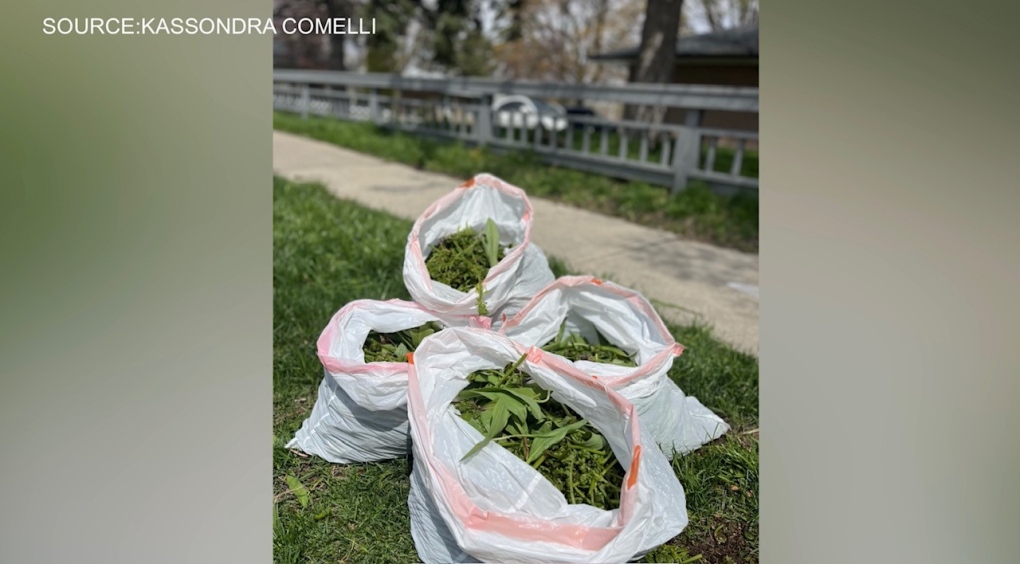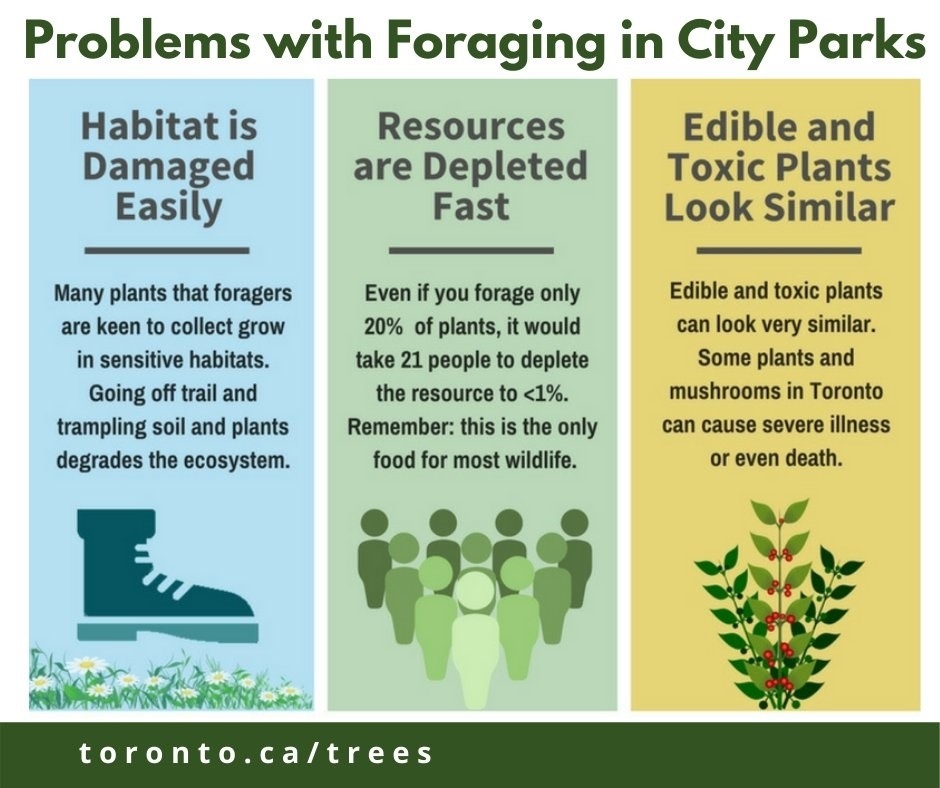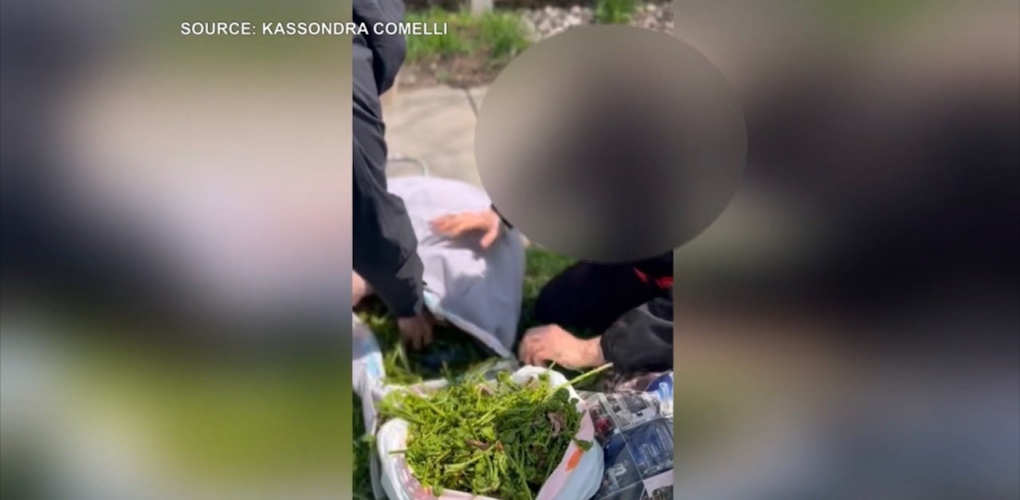Foragers filling bags of greens with illegal harvest in Toronto parks
A Scarborough dog walker wants to see better signage and enforcement in Toronto-area parks to stop people from illegally foraging fiddleheads and other greens.
Kassondra Comelli walks daily in Janellan Ravine Park and other parks in the Rouge Valley. She said she’s noticed people illegally harvesting plants over the past three years, and it’s been especially bad in the last two weeks.
“It makes me really emotional, I get really upset,” Comelli told CTV News Toronto Tuesday. “We already take so much from the land, and we don’t give enough back in the first place.”
Comelli recorded videos and images over the last few days that show people picking plants with plastic bags containing fiddleheads and other greens.
 A picture of some of the fiddleheads picked in a Toronto park. (Kassondra Comelli)
A picture of some of the fiddleheads picked in a Toronto park. (Kassondra Comelli)
It’s not clear exactly why people are taking plants from parks. Fiddleheads are edible and can be costly. CTV News Toronto spoke with one grocer who has sold them in the past for $11 a pound. Another store said it’s selling them right now for $20 a pound.
Parks Canada said in a statement it’s also aware of illegal harvesting in nearby Rouge National Urban Park, which degrades the ecological integrity of protected areas.
“With respect to fiddleheads — if they are harvested, it means that a fern frond (leaves of a fern) will not grow in that spot this year. This can adversely affect insect and animal species that rely on ferns for habitat or food,” the spokesperson said.
“The collection of natural objects from the park is prohibited under the Rouge National Urban Park Act. This includes plants, mushrooms, berries, animals, antlers, fossils, driftwood, and rocks.”
Parks Canada said wardens and compliance officers regularly monitor popular harvesting areas within the park and that signage can be found at the beginning of each trail. Fines can range up to $25,000.
Foraging plants is also prohibited at Ontario Parks. Toronto has a parks bylaw which prohibits the removal of flowers, plant material, fungus, trees or other vegetation from city parks.
At the Toronto parks where Comelli walks, she said there is no signage, and she doesn’t see enforcement officers.
How Toronto is addressing illegal harvesting
“Bylaw enforcement officers respond to complaints made through 311 and proactively patrol the 1500 plus parks in Toronto to educate the public about the Parks Bylaw,” said a City of Toronto spokesperson.
“The City monitors the volume of complaints and then deploys bylaw enforcement officers based on a priority response model that takes into account the frequency and persistence of complaints and issues in parks.”
The spokesperson said in addition to sharing social media posts on the issue, the goal is to resolve issues and ensure residents are following the bylaw, with each issue addressed on a case-by-case basis to make sure actions are reasonable, fair and appropriate.
 City of Toronto infographic on the problems with foraging in parks. (City of Toronto)
City of Toronto infographic on the problems with foraging in parks. (City of Toronto)
People are asked to respect forests, ravines and park spaces by staying on trails and not removing vegetation, the city said.
“Foraging in Toronto's parks and ravines is prohibited, can cause damage to sensitive habitats and slopes, reduces food for wildlife, and can be dangerous if consuming misidentified plants.”
City of Toronto Natural Environment Specialist Mark Sherman said when it comes to penalties, cultural sensitives exist. While the activity is likely happening more, last year, the city received 11 complaints related to plants being removed in parks.
Other adverse impacts from harvesting plants can include removing seed sources that allow the plants to spread, and decreases biodiversity and food sources for wildlife, the city said.
“Disturbing plants and soils can also introduce or disperse invasive species into new areas. These invasive plants can quickly out-compete native species, reducing biodiversity and the quality of habitat for insects and wildlife.”
“[Illegal harvesting] is escalating faster than I can get my hands on,” said Comelli. “We’re really lucky to have the places like this that we do, and if we don’t take are of them now we are not going to have them for very long,” she said.
Comelli said she’s called 311 and Toronto police about the harvesting. While police tell CTV News Toronto picking fiddleheads is not a criminal matter, Comelli said it’s time people understand the rules.
 Another image of foragers illegally picking fiddleheads from a Toronto park. (Kassondra Comelli)
Another image of foragers illegally picking fiddleheads from a Toronto park. (Kassondra Comelli)
Why reporting illegal harvesting is important
In an email to CTV News Toronto, Verena Kulak, PhD candidate School of Environmental Design and Rural Development at the University of Guelph said there is a sense that during the pandemic, people got “involved going out on walks and getting closer to nature, which may have influence the desire to forage.”
She said signage like ‘take only photos, leave only footprints’ can be problematic.
“This is a well-intentioned but hard-to-enforce guideline especially when it comes to plants.”
Kulak said parks likely lack the manpower to monitor illegal harvest, but it is always important to bring it up and give it attention.
To report incidents of illegal harvesting people can contact Parks Canada at 1-877-852-3100 or the City of Toronto at 311.
CTVNews.ca Top Stories

Second Cup closes Montreal franchise over hateful incident
Second Cup Café has closed one of its franchise locations in Montreal following allegations of hateful remarks and gestures made by the franchisee in a video that was widely circulated online during a pro-Palestinian protest on Thursday.
‘It’s pretty emotional:’ N.B. family escape fire, plan to rebuild home
A family in Riverview, N.B., is making plans for Christmas and the future after escaping a fire in their home on November, 14.
Cargo ship runs aground in St. Lawrence River near Morrisburg, Ont.
A large cargo ship remains stuck in the St. Lawrence River after running aground on Saturday afternoon.
Scurvy resurgence highlights issues of food insecurity in Canada's rural and remote areas
A disease often thought to only affect 18th century sailors is reemerging in Canada.
B.C. man awarded $800K in damages after being injured by defective bear banger
A B.C. man has been awarded nearly $800,000 in damages as compensation for injuries he sustained from a defective bear banger, according to a recent court decision.
A man called 911 for help during a home invasion. Las Vegas police fatally shot him
A Las Vegas man called for police help during a home invasion before an officer fatally shot him, according to authorities and 911 calls.
Cat caught in hunting snare rescued by BC SPCA
Donations are ramping up for a BC SPCA cat with a mangled paw after being caught in a hunting snare, one of a rising number of pets to fall prey to the hunting device.
These royal residences are opening their doors this Christmas
Not so long ago, if you wanted to spend Christmas with the royal family, the only way to get close was to press your nose up to the TV screen during the monarch’s Christmas speech.
'Still working full time on it:' One year later police continue to search for gunman in Caledon double murder linked to ex-Olympian
One year after a couple was shot and killed in their Caledon home in what investigators have described as a case of mistaken identity, Ontario Provincial Police say they are still trying to figure out who pulled the trigger.

































